|
|
|
Sort Order |
|
|
|
Items / Page
|
|
|
|
|
|
|
| Srl | Item |
| 1 |
ID:
133960
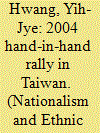

|
|
|
|
|
| Publication |
2014.
|
| Summary/Abstract |
This article investigates how a collective memory of trauma was produced in the course of commemorating the 2-28 Incident in the context of the 2004 election campaign, and how this memory production led to the parallel formation of a Taiwanese national identity. The 2-28 Hand-in-Hand Rally was designed to remember the 2-28 Incident as a historical trauma in order to be forgotten. The remembering of the 2-28 Incident must be regarded as a constructive process as opposed to a retrieval process. The memory of the 2-28 Incident was selectively constituted in favor of sovereign power.
|
|
|
|
|
|
|
|
|
|
|
|
|
|
|
|
| 2 |
ID:
183217


|
|
|
|
|
| Summary/Abstract |
This article explores how International Studies as a scientific discipline emerged and developed in China, against the background of a Sinocentric world order that had predominated in East Asia for a long time. The argument of this article is threefold. First, the discipline relied heavily on historical, legal, and political studies, and placed a heavy focus on the investigation of China's integration into the Westphalian system. Second, studies of International Relations were grounded in a problem-solving approach to various issues China was facing at various times in the course of modernisation. Third, the historical development of International Studies in China has had a profound impact on the current IR scholarship in both the PRC and Taiwan, including the recent surge of attempts to establish a Chinese School of IR theory in China and the voluntary acceptance of Western IR in Taiwan. By way of conclusion, the article suggests that there is still an indigenous Chinese site of agency with regards to developing IR. This agency exists despite the fact that in the course of the disciplinary institutionalisation of IR Chinese scholars have largely absorbed Western knowledge.
|
|
|
|
|
|
|
|
|
|
|
|
|
|
|
|
| 3 |
ID:
119271
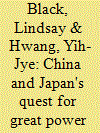

|
|
|
|
|
| Publication |
2012.
|
| Summary/Abstract |
In responding to piracy in the Gulf of Aden, both Chinese and Japanese policymakers have acted as norm entrepreneurs who intend to transform the dominant norms of international society. Chinese and Japanese norm entrepreneurship is grounded in the ways in which foreign policy actors construct and reconstruct their state identity. In China's case, policymakers have projected China's self-image as a responsible and benevolent Great Power that derives from the Chinese conception of Tianxia. Japanese foreign policy actors, on the other hand, have advanced the notion of Japan as a bridge that mediates between East and West, developing and developed states, members and non-members of international society. Although we do not advocate that Chinese or Japanese norm entrepreneurship should be accepted uncritically, we do maintain that there exist opportunities to combine and develop the multiple approaches that different states promote to problems. This article has shown that dealing with Somali piracy is one such case.
|
|
|
|
|
|
|
|
|
|
|
|
|
|
|
|
| 4 |
ID:
095331
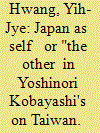

|
|
|
|
|
| Publication |
2010.
|
| Summary/Abstract |
This article is an attempt to demonstrate how and through which social practices Taiwan's past colonial experiences have been discursively produced in a certain way and what other alternatives have been excluded from this process. The article scrutinizes the controversy surrounding a Japanese manga On Taiwan, a book that provides a very positive evaluation of the legacy of Japanese colonialism in Taiwan. Through analyzing statements, utterances, and conducts concerning this manga that were produced by those who have various positions, this article aims to comprehend how the discourses of Japanese colonialism and Sino-chauvinism reciprocally conflict and compete with each other in ways that affect people's self-identification, producing a particular form of subjectivity of Taiwan, while excluding, repressing, and silencing other alternatives.
|
|
|
|
|
|
|
|
|
|
|
|
|
|
|
|
| 5 |
ID:
104362
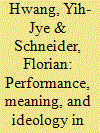

|
|
|
| 6 |
ID:
179326
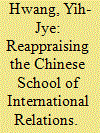

|
|
|
|
|
| Summary/Abstract |
This article aims to revisit the enterprise of the Chinese School (CS) of IR and discuss how it should be viewed and handled in the discipline, specifically from within the analytical framework of the power/resistance nexus put forward by Foucault, Bhabha, and Spivak. The argument of this article is twofold. Firstly, the CS attempts to reinvigorate traditional Chinese concepts (that is, humane authority, the Tianxia system, and relationality), which mimick Western mainstream IR. These concepts channel the CS into a realist notion of power, a liberal logic of cosmopolitanism, and a constructivist idea of relationality. Thus, the CS uses against the West concepts and themes that the West currently use against the non-Western world. Nevertheless, as the second part of the argument will demonstrate, the enterprise of the CS can still be justified because it can be regarded as a reverse discourse; mimicking yet altering the original meanings of the taken-for-granted concepts, ideas, and principles used by mainstream IR scholars. Moreover, with the judicious use of strategic essentialism, the CS can potentially be one local group in a wider effort to contest diffused and decentred forms of Western domination through linking various struggles to form a unified ‘counter-hegemonic bloc’ of post-Western IR in the discipline.
|
|
|
|
|
|
|
|
|
|
|
|
|
|
|
|
| 7 |
ID:
131640
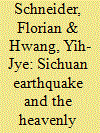

|
|
|
|
|
| Publication |
2014.
|
| Summary/Abstract |
In the aftermath of the 2008 Sichuan earthquake, the Chinese authorities launched a major public relations campaign to relay positive images of their relief effort and strengthen their political legitimacy. The effect has been a proliferation of symbols and political statements related to the disaster, not only in the official media, but also in cultural products such as movies or mass-media events. The earthquake has become part of the discourse of suffering, struggle, solidarity and ultimately victory. This article examines the ways in which various cultural products present the Sichuan earthquake and asks what meanings national crises have in the Chinese discourse on political legitimacy. The article analyses two cases: Chinese film, here in the form of Feng Xiaogang's blockbuster Aftershock, and performance-based discourses during the Beijing Olympics, the PRC's 60-Year Anniversary and the Shanghai Expo. By conducting a discourse analysis, we show how the earthquake has become part of a recurring discursive formation that is used by state and non-state actors alike to legitimate China's developmental model. Within this discourse, the leadership of the Party, the mastery of free markets and a revamped version of the Confucian idea of benevolent rule are marshaled as the decisive factors for winning any 'battle'.
|
|
|
|
|
|
|
|
|
|
|
|
|
|
|
|
| 8 |
ID:
171792
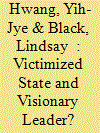

|
|
|
|
|
| Summary/Abstract |
Over the past decades, numerous critiques have emerged of China’s policy towards Africa. These critiques perceive China as a mercantilist or neocolonial power seeking to dominate the African continent through land grabs, exploitative trade deals, and resource extraction. These critiques do however not consider how the Chinese government has attempted to justify its aid policy towards Africa in ways that claim to secure human beings. Though the Chinese government has not officially adopted the concept of human security, it has engaged with the concept and developed its own interpretation of how human beings should be secured. This interpretation is based on the depiction of China as a state victimized through imperialism that has emerged in the twenty-first century as a global power with visionary ideas. Accordingly, Chinese policymakers believe they can offer an alternative model to Western interventions, imposition of neoliberal economic doctrine, and emphasis on democratization and human rights. In Africa, though China’s vision has generated benefits for some, it has also victimized others. China needs to critically reflect on and adapt its developmental vision if it truly intends to help human beings overcome the myriad challenges they face in their daily lives.
|
|
|
|
|
|
|
|
|
|
|
|
|
|
|
|
|
|
|
|
|